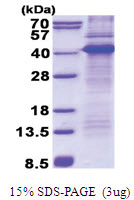CD68 (22-319, His-tag) Human Protein
Other products for "CD68"
Specifications
| Product Data | |
| Species | Human |
| Expression Host | E. coli |
| Expression cDNA Clone or AA Sequence |
MGSSHPLHHH SSGLVPRGSH MGSHMNDCPH KKSATLLPSF TVTPTVTEST GTTSHRTTKS HKTTTHRTTT TGTTSHGPTT ATHNPTTTSH GNVTVHPTSN STATSQGPST ATHSPATTSH GNATVHPTSN STATSPGFTS SAHPEPPPPS PSPSPTSKET IGDYTWTNGS QPCVHLQAQI QIRVMYTTQG GGEAWGISVL NPNKTKVQGS CEGAHPHLLL SFPYGHLSFG FMQDLQQKVV YLSYMAVEYN VSFPHAAQWT FSAQNASLRD LQAPLGQSFS CSNSSIILSP AVHLDLLSLR LQAAQLPHTG VFGQSFSCPS DRS
|
| Tag | His-tag |
| Predicted MW | 34.1 kDa |
| Concentration | lot specific |
| Purity | >85% by SDS - PAGE |
| Presentation | Purified |
| Buffer | Presentation State: Purified State: Liquid purified protein Buffer System: 20 mM Tris-HCl buffer (pH 8.0) containing 1M Urea, 10% glycerol, 0.1M NaCl |
| Preparation | Liquid purified protein |
| Protein Description | Recombinant human CD68 protein, fused to His-tag at N-terminus, was expressed in E.coli. |
| Storage | Store undiluted at 2-8°C for one week or (in aliquots) at -20°C to -80°C for longer. Avoid repeated freezing and thawing. |
| Stability | Shelf life: one year from despatch. |
| Reference Data | |
| RefSeq | NP_001035148 |
| Locus ID | 968 |
| UniProt ID | P34810 |
| Cytogenetics | 17p13.1 |
| Synonyms | GP110; LAMP4; SCARD1 |
| Summary | This gene encodes a 110-kD transmembrane glycoprotein that is highly expressed by human monocytes and tissue macrophages. It is a member of the lysosomal/endosomal-associated membrane glycoprotein (LAMP) family. The protein primarily localizes to lysosomes and endosomes with a smaller fraction circulating to the cell surface. It is a type I integral membrane protein with a heavily glycosylated extracellular domain and binds to tissue- and organ-specific lectins or selectins. The protein is also a member of the scavenger receptor family. Scavenger receptors typically function to clear cellular debris, promote phagocytosis, and mediate the recruitment and activation of macrophages. Alternative splicing results in multiple transcripts encoding different isoforms. [provided by RefSeq, Jul 2008] |
| Protein Families | Druggable Genome, Transmembrane |
| Protein Pathways | Lysosome |
Documents
| FAQs |
| SDS |
Resources
Recombinant Protein Resources |
{0} Product Review(s)
0 Product Review(s)
Submit review
Be the first one to submit a review
Product Citations
*Delivery time may vary from web posted schedule. Occasional delays may occur due to unforeseen
complexities in the preparation of your product. International customers may expect an additional 1-2 weeks
in shipping.






























































































































































































































































 Germany
Germany
 Japan
Japan
 United Kingdom
United Kingdom
 China
China
